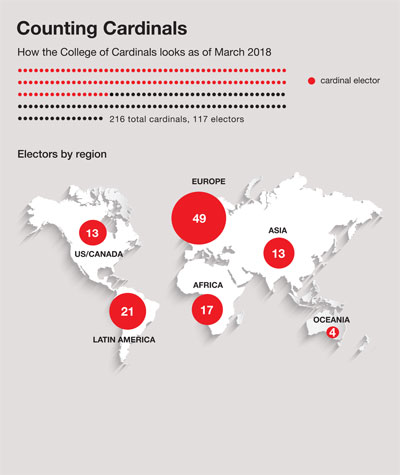 A cardinal is a senior ecclesiastic leader in the Roman Catholic Church. Cardinals, men who are chosen by the pope, have been involved in universal Church governance since the 13th century when the pope began consulting them on spiritual and temporal issues.
A cardinal is a senior ecclesiastic leader in the Roman Catholic Church. Cardinals, men who are chosen by the pope, have been involved in universal Church governance since the 13th century when the pope began consulting them on spiritual and temporal issues.
The term “cardinal” comes from the Latin word “cardinalis,” from the word “cardo,” or “hinge.” According to Church law, they should be “especially outstanding in doctrine, morals, piety and prudence in action” (Canon 351). Interestingly, they do not have to be bishops before becoming cardinals; they just have to be ordained at least to the priesthood, and once the pope chooses them they receive episcopal consecration. They “are obliged to cooperate assiduously” with the pope (Canon 356). If they are not diocesan bishops, they must live in Rome.
The collection of cardinals is called the College of Cardinals, and their principal function is the election of a new pope.
The term “Prince of the Church” regarding cardinals is a historical reference to those who held the equivalent role of a royal prince and in a feudal times ruled a principality. While certain cardinals hold on to this concept of prince in dress and behaviors, Pope Francis has stated that his newly appointed cardinals are not to be called “princes of the church,” but they are to serve the people of God and tackle the sins of the world. At one meeting Pope Francis “blasted” top cardinals for being “lustful of power, living hypocritical lives, suffering from spiritual Alzheimer’s instead of being men of God.” Pope Francis is trying to build a Church that emphasizes inclusion and mercy, focusing on serving the poor and marginalized peoples.
The pope announces new cardinals in a secret consistory – that is, a formal gathering of the College of Cardinals chaired by the pope. Ordinary consistories deal with serious or secret matters. Extraordinary consistories are called when there is a special pastoral, organization or governmental need of the Church.
Currently there are 216 members of the College of Cardinals, 117 of them under the age of 80 and eligible to vote in a conclave to elect a new pope.
While the number of cardinals has varied over the centuries, the number nearly doubled in the late 20th century. Pope Francis has appointed about one-third of the cardinals eligible to choose the next pope. Until recently, Europeans dominated the College of Cardinals. Pope Francis expanded the effort to diversify the College to reflect the Church’s global reach. He appointed cardinals from Asia, Africa and Latin America, and from countries that never had a cardinal, including Bangladesh, Lesotho and Malaysia.
Cardinals do not always share the views of the pope who appointed them. Some of their personal priorities differ from that of the pope, and they do not hesitate to publicly take issue with the pope. Such can be more than confusing to people.
Five years ago Pope Francis appointed nine cardinals to advise him on the reform of Church government, particularly the Roman Curia. This international Council of Cardinals, often referred to as the C9, met most recently with Pope Francis in late February. They have made many recommendations, recently proposing that the Congregations be more internationally staffed by a larger number of qualified laymen, women and young people and fewer priests.
Mercy Sister Jeanne-Margaret McNally is an authority on canon law and frequent lecturer at universities and dioceses. A graduate of The Catholic University of America with multiple degrees including a doctorate in psychology and a licentiate of canon law (JCL), she is a psychologist for the Tribunal of the Diocese of Charlotte and a judge in the Metropolitan Tribunal of the Archdiocese of Miami.


